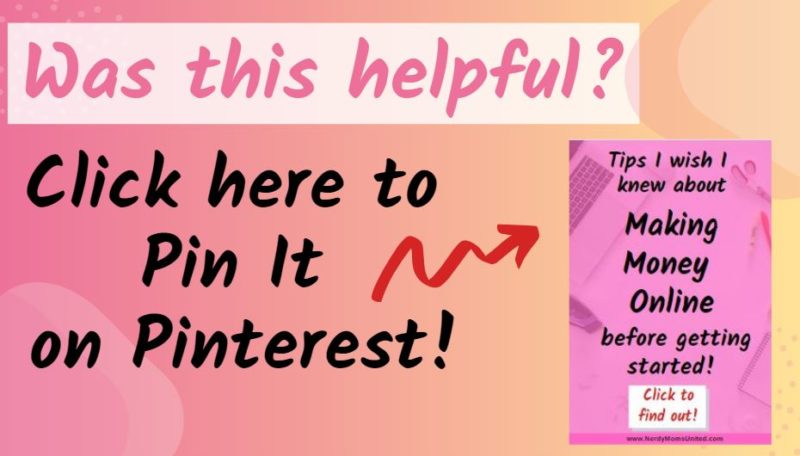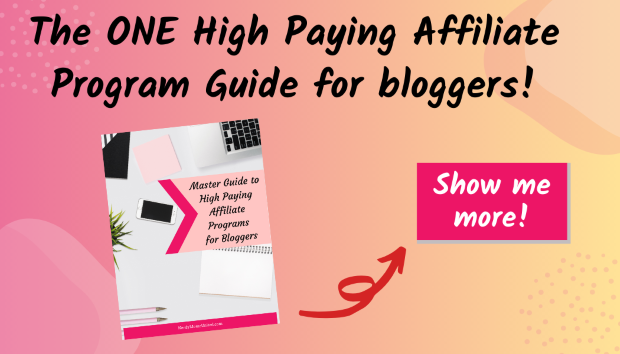I make a commission from purchases made through links in my posts, at no extra cost to you. Read my disclosure for more information.
These are the 7 things they don’t tell you about making money online with blogging. There are legal regulations and taxes you have to be aware of so you don’t get in trouble this the law. If you live in the USA, then this information applies to you. I would encourage you to read it for your own benefit if you decide to make money from home, online, blogging, and/or do affiliate marketing.
Disclaimer: I am not a tax advisor, lawyer, or qualified to give any legal advice. I only want to be upfront and honest about this information that you should be aware of.

In this post, I am going to tell you about the 7 making money online blogging tips you should know that very few people talk about.
7 Money Making Online Blogging Tips
- What is the FTC?
- What are the FTC rules about affiliate marketing?
- How to do FTC disclosures for affiliate marketing?
- 4 Laws bloggers should know about?
- How to do affiliate link disclosures on Pinterest?
- How to claiming affiliate marketing earnings on taxes?
- Additional tax and training resources for affiliate marketing
What is the FTC?
FTC is the Federal Trade Commission. If you want to learn more about who they are and what they do, here is a link to the FTC about page. (https://www.ftc.gov/about-ftc)
What are the FTC rules about affiliate marketing?
If you do any form of affiliate marketing online. Then you will need to be aware of the FTC rules on disclosing that you have affiliate links on your websites, social media, and emails. Since I am not a lawyer or qualified to give any legal advice. I will just provide the link to the FTC’s Endorsement Guide and you can read the sections apply to your chosen affiliate marketing strategy.
How to do FTC disclosures for affiliate marketing?
The Federal Trade Commission requires disclosure of these “sponsored” pins, posts, and Tweets. Because of these regulations, I keep my affiliate disclosure links in my top navigation and in the footer of my blog. That way it is visible at all times, regardless if I make a commission from the links about the products or services on the page or not.
4 Laws bloggers should know about?
There are several laws that are relevant to bloggers when it comes to affiliate marketing. These laws are centered around writing reviews and endorsement posts for products and services. I give you a brief over of what these laws are and give you links to these laws so you can see them for yourself.
- Endorsements – Section 5 of the FTC Act (15 U.S.C 45)
- Fair Use Act – Section 17 U.S.C. § 107
- Copyright Law and blogging
- Blog post comments and the law
Endorsements – Section 5 of the FTC Act (15 U.S.C 45)
FTC has written an Act called Section 5 of the FTC Act (15 U.S.C 45) to provide guidelines to bloggers about how this should be handled. Below is what bloggers need to know in a nutshell.
- You should disclose the type of relationship you have with a product or company.
- You need to make it clear which parts of your content are editorial, and which are related to advertising.
- The 15 U.S.C. 45 Act does not apply if you are reviewing a product you purchased yourself or you received for free.
- Writing a disclosure can be as simple as including a statement like this “[Name of Company] gave me this product for free.”
- If you need more information about how to deal with an endorsement when you are blogging, the FTC has provided some additional guidelines. These guidelines are written in a way to make them easy to understand.
Fair Use Act – Section 17 U.S.C. § 107
This law is related to the U.S. Copyright Act, and how bloggers can quote work that has already been published to be exact. I thought it would be helpful for you to know the guidelines about this Act.
- Make sure to cite when you are using other people content for these purposes:
- Studying or researching
- Reporting the news
- Images
- When you are making a criticism or comment on someone’s teaching. That way you are relying on the content of the text, which should fall under fair use.
- Studying or researching
- Reporting the news
- Images
- When you are making a criticism or comment on someone’s teaching. That way you are relying on the content of the text, which should fall under fair use.
- In the United States, the legal system does favor transformative uses. What does this mean? Information that is used and needed to produce a commentary on the subject or using existing content in a new context.
- Here are the four factors the courts are looking for when deciding when something is constituted as fair use:
- How was the content used and why
- How much of the original work was used
- The nature of the copyrighted work
- The impact on the market
- How was the content used and why
- How much of the original work was used
- The nature of the copyrighted work
- The impact on the market
Copyright Law and blogging
Before 1989, it was required for all copyrighted materials and works (ie. written, music, and so on) to have a copyright text or symbol to declare the existence of the copyright. This law has changed since then, because of the internet. When you write and publish a blog post it is considered copyrighted as soon as it is published and / or created.

This is great news for us bloggers but don’t forget to make sure you have the copyright text or symbol on your site. It is a good idea and best practice to have displayed on all of your pages. I keep mine in the footer of my website so I know it will be available at all times. This is important if you plan to be a blogger long term as a possible career and there are very successful bloggers out there too.
Blog post comments and the law
Did you know that when people leave a comment on your post it falls under the user-generated content. That means you do not own the copyright to that user’s comment, the user owns the rights to it. How do you solve this problem? In your “terms of service agreement” page, you can add language in there that states that everyone must abide by it before they adding a comment to your posts.
You can make it impossible for them to leave a comment, without them agreeing to those conditions. By doing this you are protecting yourself from a commenter who tries to raise a dispute about who owns the copyright. By including this information in your “terms of service” page covers you if and when this happens. You can also turn off commenting on all posts and then it will never be a problem.
How to do affiliate link disclosures on Pinterest?
For example, if you are going to use Pinterest for affiliate marketing, you will have to follow this FTC rule.
The most important rule you need to remember when adding affiliate links is to mention that it is an affiliate link. In your pin descriptions, Pinterest urges you to always disclose that it is an affiliate link and affiliate networks require it. You can write this within your description or use #affiliate, #Ad, or #afflink at the end of your description. This needs to be done to follow affiliate network rules and abide by FTC regulations. Failure to do so can get you banned from Pinterest.
You will have to check with the other social media platforms’ policies on their affiliate marketing rules. Failing to follow their affiliate disclosure rules will get you kicked out of those platforms.
How to claiming affiliate marketing earnings on taxes?
I know this not a very popular topic but its something you need to be aware of. This information will apply to you if you are in the USA. I will say this again I am not a tax advisor, lawyer, or qualified to give any legal advice. I am only making you aware of this information. I have noticed very few sites will tell you that when you do affiliate marketing, you will need to deal with taxes.
When you earn money from affiliate marketing it is considered income and you will need to claim it on taxes. Since I am not a tax advisor, I will do the next best thing instead. I will just provide the links to the IRS website below. Please talk to a tax advisor about any tax concerns you might have.
Have questions about taxes? Get help with Nolo’s tax products.
Tax Information For Businesses
Deducting Business Expenses
Sole Proprietorships
Limited Liability Company or LLC
Additional tax and training resources for affiliate marketing
Other than the government IRS website, here is more information on tax deductions, if you work from home. The information I found on these websites, to be very useful.
https://www.thepennyhoarder.com/taxes/tax-deductions-if-you-work-from-home/
https://turbotax.intuit.com/tax-tools/tax-tips/Self-Employment-Taxes/Tax-Tips-for-Bloggers/INF22232.html
The other resources I have found, that are open about these topics were legitimate courses. They would go into detail on how to do affiliate marketing and how to do it the correct way. They do not want their students to get in trouble with taxes or the FTC. This is only been from my experience so far, and you can take it with a grain of salt too.
Do you want to learn more about courses that cover affiliate marketing training? Check out this post on Affiliate Marketing Courses!
I hope this information was helpful to you. It was not meant to discourage you from perusing affiliate marketing or making money online. I only wanted to make you aware of these important facts, so you will have as much information as possible.
Still, feeling a little lost in when it comes to blogging!? Don’t feel bad, I had the same struggles when I create my first blog too. I have some free templates and checklists that can help you with getting past everyday blogging hurdles. Do you want to learn more? Click here to get your free templates and checklists.
Other helpful related posts about blogging …
How To Start A Blog In 8 Easy Steps
How To Choose Your Blog Niche?
Resources to Start Your First Blog
How To Make Money Online
7 Making Money Online Tips: Legal Issues You Should Know About As A Blogger
11 Blogging Mistakes to Avoid That Can Cost You!
Does Google Penalize For Keyword Stuffing and How It Hurts Your Blog’s SEO
How Do Bloggers Make Money Online? The Real Truth!
Why You Are Not Making Money with Amazon Affiliate Program? I Will Reveal Why!
Which Affiliate Programs Should You Choose?
The Best Tools for Affiliate Marketing

I make a commission from purchases made through links in my posts, at no extra cost to you. Read my disclosure for more information.

Subscribe to Nerdy Moms United!
Get updates on the latest posts and more straight to your inbox!
Looking for more posts about blogging?
-

How To Start A Pinterest Business Account To Get Free Blog Traffic?
When I first started blogging, I didn’t know you could uses Pinterest to promote your blog’s content to get free traffic. That’s right, traffic for free! Who doesn’t want to get free traffic coming to their blog!? …
-

How To Make Money With Your Blog Using An Ad Network
Do want to know how to monetize your blog with an ad network? But you don’t know where to start? I have reviewed the top 5 ad networks for bloggers,…
-

How Do Bloggers Make Money? The Real Truth!
“How do bloggers make money online?” I get this question all the time from friends and family when I tell them I am a blogger. Do I earn money online as a blogger? Absolutely and I am going to tell you how!
-

Tailwind Review: Will Tailwind help you boost traffic to your blog?
In this Tailwind review, I will tell you about the Tailwind app and how it can help you with your marketing strategy for your business or blog. I personally use Tailwind for all my social media marketing strategy and it helps me to drive free traffic to my blog…
-

ConvertKit Review for 2022: Comparing ConvertKit Plans, Pros, and Cons
In this ConvertKit review, I will tell you about the pros and cons of this email marketing software. Whether you are an email marketing beginner or you are looking for an email marketing service to help you with your business strategy. Nothing is more frustrating than …
-

How To Make Money Online In 8 Easy Steps For Beginners
Do you want to learn more about how to make money online? Before I got started with my blogging and affiliate marketing, I did months of research on how to make money online.


These are important things that most bloggers don’t even consider when setting out on their blogging journey.
thanks for sharing! you find a million blogs that tell you how to start a website but very few that actually talk about the legal stuff! A good blogger makes sure they follow all the legal requirements especially if they recommending someone’ else product
This is a great resource for helpful tips. Thanks so much for this.
You’re welcome, Lina!
Wow, thank you so much for this post. This is just what I needed!
I glad to help you out Nart!
Thanks for all these helpful tips. I had gotten forgetful about adding #affiliate to my pins. So I just edited all the pins on my board! I will check about adding the copyright text to my footer, also.
You’re welcome!
As a new blogger I found this post incredibly helpful .You don’t realize all of the things involved in this line of work…Thank you for sharing this!
I am happy that you enjoy the post and that you found it helpful.
This is really amazing information! I know there are legal implications or factors to blogging but I didn’t know the details especially in relation to the Fair Use Act. Thank you so much.
Thank you, Chad! I also learned a lot when I was doing research on this post, that I even included it in the training that I give about blogging. This information was too important and I had to share it will all of you.
I’m not that much of an online reader, to be honest but your sites really nice, keep it up! I’ll go ahead and bookmark your site to come back in the future. All the best!
Thank you Nicole!